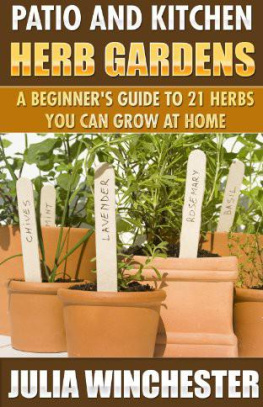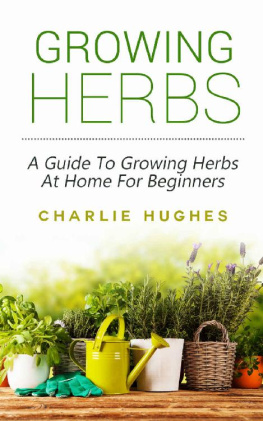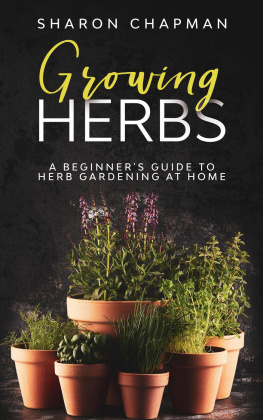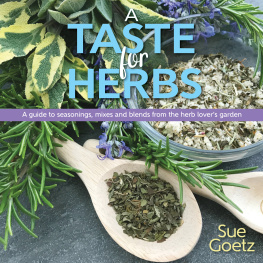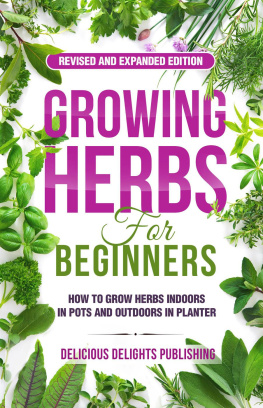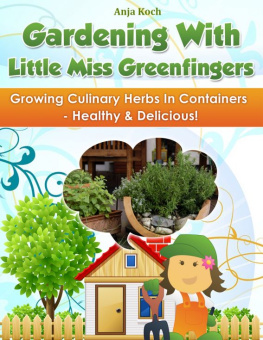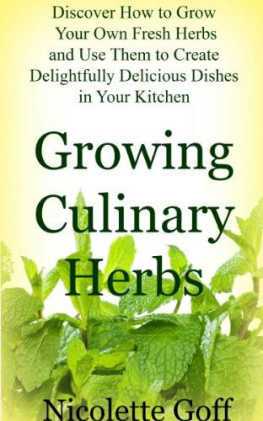Patio and Kitchen Herb Gardens
A Beginners Guide to 21 Herbs You Can Grow at Home
by Julia Winchester
First Published in 2013 by Cardigan River LLC
Copyright 2013 Julia Winchester
Photo credits: Cover: Tim Scott - Fotolia.com
ISBN 10: 0988443368
ISBN 13: 978-0-9884433-6-5
All rights reserved. No part of this publication may be reproduced, including scanning and photocopying, or distributed in any form or by any means, electronic or mechanical, or stored in a database or retrieval system without prior written consent from the publisher of this book. Reviewers may quote brief passages in reviews.
Disclaimer
No part of this publication may be reproduced or transmitted in any form or by any means, mechanical or electronic, including photocopying or recording, or by any information storage and retrieval system, or transmitted by email without permission in writing from the publisher.
While all attempts have been made to verify the information provided in this publication, neither the author nor the publisher assumes any responsibility for errors, omissions, or contrary interpretations of the subject matter herein.
This book is for educational purposes only. The publisher and authors of this instructional book are not responsible in any manner whatsoever for any adverse effects arising directly or indirectly as a result of the information provided in this book. The views expressed are those of the author alone, and should not be taken as expert instruction or commands. The use of any information provided in this book is solely at your own risk.
Adherence to all applicable laws and regulations, including international, federal, state and local governing professional licensing, business practices, advertising, and all other aspects of doing business in the US, Canada or any other jurisdiction is the sole responsibility of the purchaser or reader.
Any perceived slight of any individual or organization is purely unintentional.
Table of Contents
Chapter 1: Introduction
Why Grow Herbs?
Wouldn't it be great if you could reach over to your windowsill, grab some freshly grown herbs, toss them into a pan to flavor your dish with flare and then to serve them to your guests? Sure, you would have incredible flavor and all kinds of healthy nutrients, but you would look like a superstar chef! Who doesn't want that?
Growing herbs at home, whether on a patio, windowsill, or even the balcony of your apartment is a real option. In fact, it is one of the best ways for you to finally get the nutrients your body needs with the flavor you are craving. Why do it? Why put the time and money into growing them from scratch or even just growing plants like this? Just consider a few of the main reasons so many are using this method to get the herbs they want and need.
It's Space Saving at Its Best
One of the main reasons to grow herbs in the kitchen or on the patio is because it is one of the most convenient options available. In an urban setting, you may not have a lot of room to spread out. You may not have a plot of land in the backyard to create an incredible garden out of. This is a common problem.
- You don't have access to green space.
- You don't want to dig up your garden or yard to make room for a garden.
- You simply do not want to spend your time on your hands and knees digging through weeds.
- You are not allowed to dig - it's a condo or a rental home.
- There's not enough sunlight for direct plant growth.
However, you want the benefits that can come from access to herbs for your meals. Using a small space in your apartment, condo, or even your home, you can create exactly what you want in terms of quality herbs.
In fact, all you need is a small amount of space like the sill. Depending on how many plants you wish to grow and the type, you may only need a few individualized pots to hold each of the herbs you hope to grow. As long as you can place this by the windowsill or in an area where there is ample direct sunlight, you have all of the space you need for a fantastic growing garden.
It's Economical
You could do what many people are doing to get fresh herbs. They buy packages of them in the grocery store. Those packages come with four or five leaves of the fresh herb. The problem is, that little package can also cost you $5 to $8. That means for one pasta dish, you may spend more on the herbs than the pasta and the sauce combined. It just does not make sense especially if you want to have access to the finest herbs on a regular basis.
It's frugal, on the other hand, to invest in some quality pots and soil and grow your own. Though you will need to learn how to do this, it takes just a few minutes of your time to set it up and to put this in place. Once the plants begin to grow, you'll have no limitation on the access you have to the herbs you want to enjoy.
You can easily step over to the window, harvest a few leaves, add them to a dish, and enjoy them. There's no worry about not having something in hand. Even better, you can control how much you grow. Though you may have to replant from time to time, especially if you are planning to be a heavy user of herbs, you'll find that it will cost you probably $10 to $20 one time to have continuously available herbs at your disposal. Is there any reason to put off this process any longer? It will save you money in the long term.
It Could Be Better for You
When you plant and grow your own herbs, you are able to control every element in them. That means you can select organic soils and seeds. You choose if you need to add pesticides or fertilizers, preferably natural and organic choices since the option is yours. That means you do not have to worry about what's on the herbs you are consuming.
Think about this. If you've ever purchased those plastic containers of herbs with a few leaves in them, have you ever noticed that they tend to last for several days even up to a week? Now, if you went into your garden and picked a few leaves from a plant, would they really last that long? Not likely. This is a key indication that there are chemicals or products added to these leaves to keep them looking good for days after they are picked.
This can also indicate that there is a reduced level of nutrition in herbs. As you will learn, there are many reasons to invest in herbs grown fresh. However, if you are buying prepackaged products, including anything that's frozen, canned, or dried, you are not going to get the highest concentration of nutrients you need and deserve. That's a big problem. Rather, you'll get poor levels of the nutrients you need.
Depending on the type of herb you buy, you could be getting a very rich level of nutrients. Herbs may contain:
- An assortment of vitamins
- Numerous minerals your body needs
- High antioxidant levels which are good for fighting toxins in the body
This can help you to fight off illness, boost your overall health, and even help you to sharpen your mental abilities. When it comes down to it, herbs are good for you. You may even be able to use them as an herbal remedy. Perhaps you want to tap into them to help you to fight off a cold. You can use them to help with infections, too. The bottom line is that herbs - in their fresh state - are very good for you.
It's Visually Stimulating
If you are still looking for a reason for why you should incorporate an herb garden on your porch or window, just think of all of the dishes you'll be motivated to make when those herbs are just sitting there ready for your use.
- Perhaps you'll be motivated to create a fresh salad with vibrant greens.
- Maybe you'll get motivated to make fresh sauce from scratch using basil and parsley.
- You may be able to make a wonderful fish dish that you've loved for years that doesn't taste good without the use of fresh herbs.
Next page
